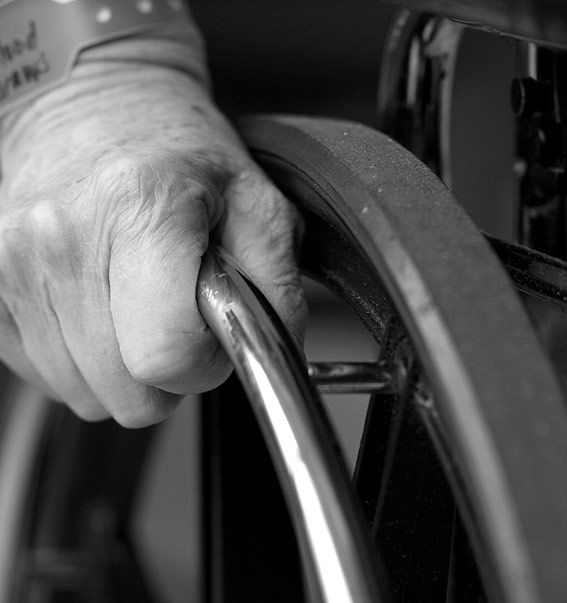Main Content
Your Case is Our Cause
Over $50 Million Recovered for Accident and Nursing Home Victims
Experienced White Plains, New York
Injury and Accident Attorneys
Nursing Home Abuse | Personal Injury | Medical Malpractice | Auto Accidents
For more than 40 years, the White Plains injury lawyers at the Law Offices of Thomas L. Gallivan, PLLC have provided aggressive and focused representation to clients with complicated legal needs. We are a full-service law firm representing clients throughout the counties of the Bronx, Westchester, Rockland, Orange, Brooklyn, Queens, Manhattan, Nassau, and Suffolk.
Our White PLains, NY attorneys are committed to protecting the rights of our most vulnerable citizens, the elderly. As a result, our attorneys concentrate in the area of nursing home abuse and nursing home neglect. We aggressively represent victims of nursing home neglect or abuse. Our attorneys take the time to understand the specific situation of each victim and their family, and we act as compassionate guides throughout the legal process. The Law Offices of Thomas L. Gallivan, PLLC is uniquely situated to protect the rights of victims of nursing home neglect or abuse. Our law firm has two in-house registered nurses with experience in working in the nursing home environment.

Our Practice Areas
Full-Service Law Firm Serving White Plains and all of New York
View All Practice Areas








CLIENT REVIEWS


" Last year I was injured in an accident, and for the first time, needed the advice of an attorney regarding how to proceed. I was referred to Thomas Gallivan through a family member who is a lawyer in Massachusetts. I am beyond pleased with how Thomas handled my case. He was knowledgeable, professional, and although the case was not as straightforward as some, he used every resource to ensure a positive outcome. Thomas communicated with me regularly and I felt completely informed and confident in his ability. He expertly negotiated a fair settlement that I was very happy with. The entire experience was extremely positive, during a stressful time for me. Thank you Thomas. "
Melanie

" Attorney Thomas Gallivan is a wonderful attorney!! I particularly liked his professionalism, consistency, always kept us updated on the case, and available upon request. He worked extremely hard and was persistent on getting the best settlement in a timely matter. I truly appreciated his prompt responsiveness to emails and phone calls. The office staff was very pleasant and made sure to get messages to him asap. Glad we chose this law firm, would highly recommend and in the event that we ever need an attorney again, Gallivan & Gallivan would be my primary choice. "
Katherine R.

" I was a passenger on a motorcycle and ended up falling off the back of the bike due to the driver acting like an idiot. I fell off at a high rate of speed and was very banged up. Fractured wrist and road rash down my back and elbows. I am lucky I didnt die. Not knowing what to do I contacted Thomas and he could not have been anymore helpful!! He went out of his way to meet with me. He actually came to my house for the initial consultation. "
Colin W.
Get A Free Consultation
(914) 220-1086 | info@gallivanlawfirm.com
We offer client services throughout the state of New York in a broad range of legal practice areas. Your family’s nursing home abuse, medical malpractice or personal injury legal needs call for dedicated and aggressive lawyers.
$9,500,000
$2,000,000
$1,050,000
$1,650,000
$1,850,000
$500,000
Our Attorneys
Thomas L. Gallivan represents individuals and families in matters of nursing home neglect and abuse, medical malpractice and personal injury. He has extensive experience representing the elderly in nursing home matters involving bedsores (pressure injuries, pressure ulcers, decubitus ulcers), falls resulting in fractures and death, sexual abuse, physical abuse, choking, aspiration, sepsis, and wrongful death. Mr. Gallivan is of counsel to Duffy & Duffy, LLP, one of the preeminent personal injury firms in New York. He has recovered in excess of $30,000,000 for nursing home victims and millions more for those injured due to medical malpractice, birth injuries, motor vehicle accidents, slip and falls, and construction accidents.
James C. Freeman, Of Counsel to Law Offices of Thomas L. Gallivan, PLLC, Attorneys at Law, is a highly experienced civil litigator who has recovered millions of dollars on behalf of his clients. His personal injury and medical malpractice verdicts and settlements have been publicized in various media outlets. Early on in his legal career, Mr. Freeman worked as an Assistant County Attorney for Westchester County from 1990-1995. Mr. Freeman also represented physicians and hospitals at a well respected defense firm. His experience on both sides of the aisle works to the benefit of all his current clients, medical malpractice and personal injury plaintiffs.Mr. Freeman is an active member of the Westchester County and American Bar..
Andrew J. Gilbride joins Law Offices of Thomas L. Gallivan, PLLC, Attorneys at Law, bringing with him twenty-five years of experience in the financial markets. His extensive background in financial futures, foreign exchange trading and securities makes Mr. Gilbride the right fit to lead our expansion into securities arbitrations. Mr. Gilbride was a former member of the NYMEX division of the Chicago Mercantile Exchange, (CME), acting as both a retail broker and a floor broker and has previously served on multiple appointed committees on the exchange most notably the Adjudication Panel and the Training and Education Committee.In addition to securities arbitrations, Mr. Gilbride will be opening our new Suffolk County..
Get a Free Consultation Today
For trusted legal advice about your accident, contact the Law Offices of Thomas L. Gallivan, PLLC for a free consultation. If you have been injured or lost a loved one, our attorneys will fight to get you maximum compensation for your losses. Don’t face this struggle alone: you can contact us 24-7 and we’ll be there when you need us. We serve clients throughout White Plains, Uniondale, Riverhead, Bronx, Westchester, Rockland, Orange, Brooklyn, Queens, Manhattan, Nassau, and Suffolk.
Contact us today by phone, fax or e-mail to schedule your free initial consultation.
We look forward to meeting you and working with you.
"*" indicates required fields
Notable Cases
The experienced New York Attorneys at the Law Offices of Thomas L. Gallivan, PLLC, Attorneys at Law, have a proven track record of success in handling personal injury, medical malpractice, nursing home neglect and criminal defense cases. The links below will take to you a sampling of notable cases handled by our attorneys:

Notable Medical Malpractice Settlements and Verdicts
$2,000,000 Medical Malpractice Settlement - Failure to Diagnose Cancer - Westchester County The plaintiff, a 37-year-old grocery store worker, claimed that as a result of the failure to diagnose, she suffered from breast cancer that has metastisized to her liver and bones, causing scarring and requiring a radical mastectomy and two reconstructive surgeries.
$1,950,000 Medical Malpractice Settlement - Anesthesiologist Malpractice - Westchester County 61 year-old male suffered oxygen deprivation during a routine colonoscopy. The anesthesiologist failed to provide appropriate sedation and properly monitor our client’s oxygenation during and after the procedure.

Notable Nursing Home Neglect and Abuse Settlements and Verdicts
$490,000 Nursing Home Neglect Settlement - Kings County A Brooklyn nursing home resident suffered a large Stage IV sacral bedsore. The bedsore recurred a few months after healing. She also suffered a fall resulting in a fracture of the right foot at the same facility. Confidential Nursing Home Abuse Settlement - Richmond County
Client developed severe Stage IV pressure sore on her sacrum while a resident at a local nursing home. The pressure sore became infected, resulting in her death. Experts in nursing and geriatrics were ready to testify at trial. $375,000 Fall/Fracture and Bedsore Settlement - Queens County A ninety-five (95) year-old female suffering from Alzheimer’s Disease, ostearthritis and dysphagia
Latest Blog

OSHA: Contractor Willfully Put Workers on Unsafe Roof
Will the EPA Finally Ban Asbestos?

Signs of Nursing Home Abuse and How to Recognize Them
Stage 4 Bedsores and Pressure Ulcer Lawsuits and Settlements
Our Dedicated Attorneys
At the Law Offices of Thomas L. Gallivan, PLLC, we know that a serious injury can leave you physically, emotionally, and financially vulnerable. When you’re struggling to recover, dealing with insurance companies and the legal system can be overwhelming.

Our accident and injury attorneys advocate aggressively on your behalf so you get the compensation you need. Your cause becomes our cause as we negotiate a full and fair settlement of your personal injury claim.
The Law Offices of Thomas L. Gallivan, PLLC has helped hundreds of injury victims in and around New York recover the settlement or award they need to pay for medical care and regain financial stability. Our personal injury lawyers collectively have over 100 years of experience getting best results in accident claims. Whether you’ve been injured in a motor vehicle collision, slip and fall, construction accident, pedestrian accidents, or by nursing home abuse, we are ready to help you and your family.
Our Attorneys Fight for Your Recovery
If you've been injured by someone else's negligence, you need a deeply committed personal injury lawyer to get fair compensation for your losses and injuries. Our skilled attorneys have the experience and dedication you need to get your life back on track after an accident. When you work with our firm, you won't just be a case among thousands. We truly care about our clients and treat each case as if it belonged to a member of our own family.
Average New York Injury Settlement
The average settlement amount for personal injury cases in New York varies greatly. Your case's value depends on a number of factors, including property damage, medical bills, lost wages, and other damages you suffered. If you require ongoing medical treatment or personal support, the value of these services must also be taken into account. Should you be disabled, your New York injury lawyer will calculate the value of lost future income as well.
In some cases, a defendant may have acted so recklessly that punitive damages, also known as exemplary damages, apply. Although rarely awarded, they can occur if, for example, you were seriously injured by a drunk driver with a history of DUI convictions.
At the Law Offices of Thomas L. Gallivan, PLLC, we always fight for the maximum compensation for our clients. For example, we have recovered over $30 million for nursing home victims alone. Although every case is different, our goal is always to get the money you need to remain financially stable as you recover.

Our Practice Areas
Personal Injury
Every year, thousands of New York residents are injured by the careless or negligent actions of another party. Examples include, but not are not limited to:
- Car accidents caused by drunk or distracted drivers
- Slip and fall accidents due to unsafe conditions in homes or businesses
- Negligent supervision at a daycare or school
- Poorly designed or manufactured consumer products
A serious accident can leave you with high medical bills and months of lost wages, but Insurance companies are not always willing to pay you what your case is worth. The White Plains, New York personal injury attorneys at our firm will insist on maximum compensation for you and file a personal injury lawsuit if the insurance provider refuses to be reasonable.
Nursing Home Neglect
Nursing home abuse and neglect have reached epic proportions across the country. Many elder care and nursing home facilities provide excellent care and nurturing environments, but there are also many that do not. This negligence leads to unexplained deaths, injuries like pressure sores and bedsores, and preventable illnesses. If you suspect that an elderly loved one is being mistreated at their care facility, speak to a nursing home abuse attorney at our firm.
Medical Malpractice
Every day, patients in hospitals and clinics across New York fail to receive adequate care due to medical provider negligence. When we put our lives in the hands of care providers, we have a right to expect that they will do everything they can to help and protect us. If a doctor, nurse, or other medical professional has violated your trust, a medical malpractice attorney at our firm will aggressively seek full compensation for you and your family.
Birth Injury
When medical professionals handle problems incorrectly during your baby’s delivery, birth injuries can occur. Birth injuries can range in severity from temporary bruises to more serious conditions such as cerebral palsy, brachial palsy, brain damage, or even death. The most severe of these injuries can require lifelong care. The experienced birth injury attorneys at the Law Offices of Thomas L. Gallivan, PLLC will fight for the justice you and your baby deserve.
Construction Accidents
Construction zones and workplaces are full of hazards. When someone acts in a careless manner, there’s a high likelihood that serious injury or death may occur.
Common accidents include falls, electrocution, falling objects, scaffolding collapse, and crane accidents. If you’ve been hurt, our New York construction accident attorneys will use their knowledge of the laws that govern your particular accident to hold the careless party or parties accountable.
Car Accidents
New York roads and highways can be dangerous places. All it can take is a single encounter with a distracted, intoxicated, or reckless driver to change your life forever. Due to the size and high travel speeds of most motor vehicles, many victims sustain severe injuries like traumatic brain injury and spinal cord injury. The outcome can be even worse if large commercial vehicles like semi-trucks are involved. The car accident attorneys at the Law Offices of Thomas L. Gallivan, PLLC have obtained significant awards for crash victims over the years and will fight for an equally favorable outcome for your case.
Wrongful Death
The loss of a loved one is a tragic and life-altering experience, and more so when it is a result of someone else’s negligence. When a loved one dies, survivors may file a wrongful death lawsuit on their behalf to receive compensation for funeral expenses, loss of financial support, lost companionship, and more. At the Law Offices of Thomas L. Gallivan, PLLC, our New York wrongful death attorneys are committed to providing the compassionate legal advocacy you need.
FAQS
Q. When Should I Call a New York Injury Attorney?
Ideally, you should call a personal injury lawyer as soon as you know you have compensable injuries caused by another party. A skilled attorney can:
- Assess your claim and assign a value
- Handle negotiations with the insurance providers responsible for compensating you
- Take your case to court if the insurer devalues your claim or refuses to pay
Without legal representation, you may get less money than you need or struggle with an insurer who’s determined to pay as little as possible.
New York is a pure comparative negligence state for injury claims. The law states that even if you were partially responsible for the accident, you can still claim damages, but the amount you receive will be reduced by your percentage of fault. Insurance companies are notorious for assigning unfair levels of blame to claimants so they can minimize any payout. You can trust our New York injury attorneys to protect your rights in all communications with an insurer.
Q. How Long Do I Have to File a Personal Injury Claim in New York?
In most cases, you have up to three years to file a personal injury claim. If you are suing a government entity, you must generally file your formal claim within 90 days and up to a year to file an actual lawsuit. Claims against the government are especially complex and require help from a personal injury lawyer for best results.
There are some exceptions to the three-year deadline:
- If you were under a legal disability at the time of the accident, (e.g., a minor or mentally incapacitated), the countdown for filing a lawsuit usually won’t begin until that disability is lifted, meaning that you turn 18 or regain mental capacity.
- If the defendant leaves New York state before you can file your lawsuit and is gone for at least four months, their absence likely won’t be included in the three-year time limit.
- If your injuries were due to medical malpractice, the deadline is two and a half years from the date of the malpractice.
The New York injury attorneys at the Law Offices of Thomas L. Gallivan, PLLC can ensure that your claim is filed within the allowed time period, so you preserve your right to sue.
Q. How Much Does It Cost to Hire a Personal Injury Lawyer?
Many people who need a personal injury lawyer have been placed in financial difficulty by their accident and are worried about whether they can afford legal counsel. Our law firm takes cases on a contingency fee basis, meaning that we collect our fees from your settlement or award. You owe us no money upfront and nothing at all if we don’t secure a financial recovery for you.
We’re ready to fight on your behalf, so schedule your free consultation today. Our New York injury attorneys are available to answer your call 24 hours a day, seven days a week.







